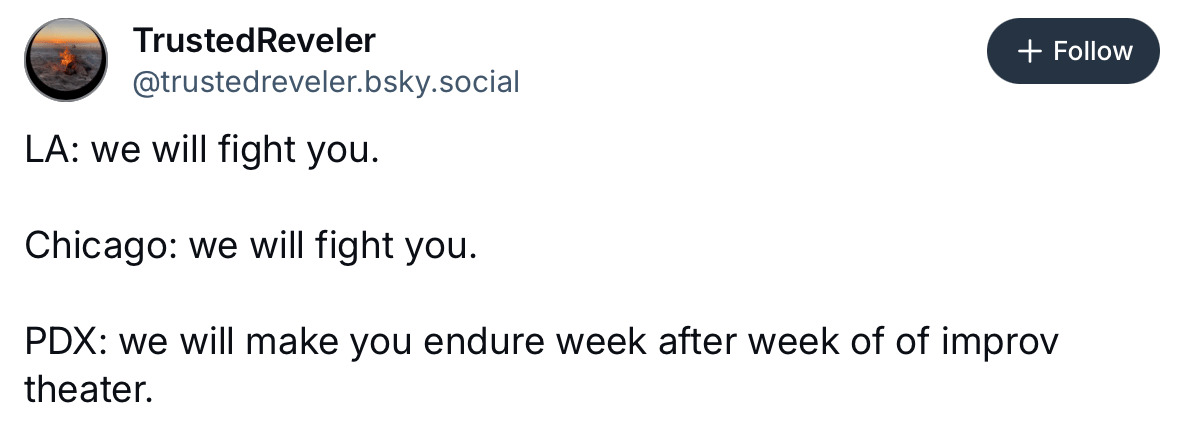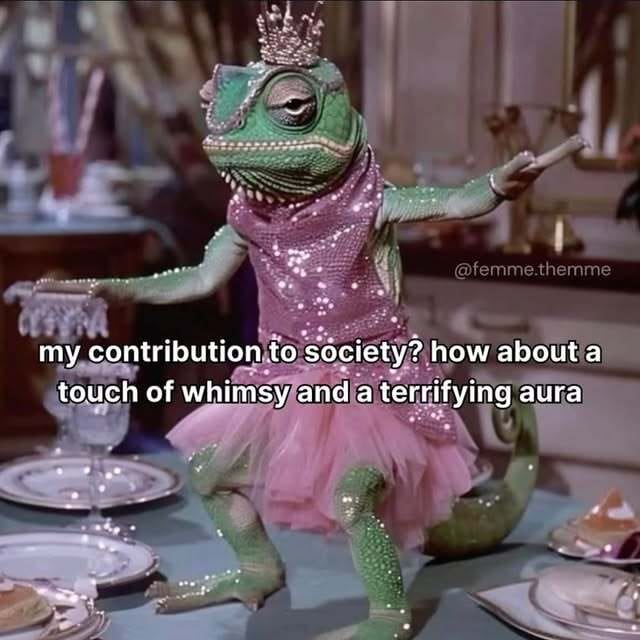This week, I learned a fun new term: tactical frivolity.
The exact origins of the phrase don’t seem to be totally clear (though I see Mikhail Bakhtin’s 1985 book Rabelais and His World mentioned frequently), but the phenomenon itself has been around for millennia — from all the way to the Classical period of Ancient Greece to this very moment in Portland, Oregon.
“The whimsical protests we’re seeing in Portland,” writes artist and historian Diane Irby, “are historically grounded in a long tradition of dissent. The idea that humor, satire, and even outright silliness can be powerful tools of dissent goes back centuries. Scholars call it tactical frivolity; a form of protest that uses comedy, absurdity, and carnival-like antics to challenge authority and expose injustice.”
Such as, one might say, a bunch of people in inflatable animal suits, making themselves an absolute nuisance to fascist institutions of power.
I’m thinking about this a lot today, not just because the memes are incredible and the actual social impact in terms of movement morale genuinely amazing, but because the idea of leaning into frivolity in a political moment determined to break our collective spirit seems like it should be obvious…but somehow takes tremendous effort. I happen to live with two of the goofiest, funniest kids on the face of the planet (not that I’m biased, but, needs must) but meeting their determined daily silliness with attention and presence and laughter is hard these days — and feels like it’s getting harder day after day.
But determined daily silliness is the best way I can think of conveying what they do. Humor and laughter and play — all of these are skills that come so easily to the youngest of us, even in the most unimaginable circumstances. But as adults, we have to cultivate them. We fall out of the habit of infusing our days with whimsy and replacing that silliness with emails and bills and laundry, and while the emails need to be sent and the bills paid and the laundry done, the question remains: What do we lose when we drag ourselves through the muck of daily living, without carving out room for moments of levity?
And more than that, what do we lose from our movements, when the expectations are that we show up with our rage and our grief and our determined spirits, but without any sense of joy?

source unknown, but vibes spectacular
“At its heart,” Irby writes, “tactical frivolity offers a zone of shared action, one that transcends barriers of physical condition, legal status, language, or social class. […] whimsical protests intentionally disrupt the expected solemnity of many demonstrations, using humor and creativity to capture public and media attention. From medieval carnivals to clown counterprotests, the message is the same: ridicule can be revolutionary.”
We can all, I think, use a bit of ridicule and whimsy in our revolutions and resistance. My goal — for this week, at least — is to follow the example set by my ridiculous children, and cultivate some intentional silliness. What that might look like for my creative practice, I’m not sure.
But I’m looking forward to finding out.
your friday five!
this week’s highlights on creating for good
The Future of Being Trans on the Internet (edited by Marina Galperina, Kevin Nguyen, and Adi Robertson, The Verge)
This is maybe cheating, because it’s a collection of pieces rather than a single article, but it’s absolutely worth reading. The internet has been a refuge for trans communities, but what is that refuge going to look like as we move increasingly towards more surveillance, less anonymity, more AI slop, and a lack of digital security? These essays examine what those futures could look like, how we can keep building community and keeping one another safe, and how our online and offline communities can support — rather than endanger — the futures we can build.
The Ballad of the Portland Frog Brigade (Hot Garbage Productions)
“What happens when a giant frog, a chicken, a bear, and a unicorn take to the rainy streets of Portland? You get The Frog Brigade — a hilarious, heart-warming, and foot-stompin’ country-folk anthem about standing up (and hopping up) for what’s right, with laughter leading the way!”
Tactical frivolity in practice, with a catchy-as-fuck soundtrack.
Editor’s Note | What Bees Can Teach Us About Community (Torsheta Jackson for The Mississippi Free Press)
I’m extremely obsessed with bees. I find them generally delightful, I make my partner plant bee-attracting flowers in our garden every spring (see previous newsletters for further commentary on my plant-killing hands and why I leave all flower cultivation to said partner), I am a sucker for a good jar of honey and therefore believe that we should keep our apiary overlords as happy as possible.
But what I also love about bees is that they are, by nature, a communal species. Bees do everything in, through, and for community: They are creatures of interconnection, and even a queen can’t thrive on her own.
In this piece, Jackson reflects on a discussion question that Gabrielle Wyatt, founder of the Highland Project, asked at the organization’s Summer Dinner, which Jackson attended:
At one point during the evening, Wyatt talked about bees—creatures that are wired for community. In a beehive, every single bee has a specific role to play. They work together and depend on each other to do what needs to be done so that the hive as a whole can thrive. […] She then asked us, “What is your contribution to the hive?”
Jackson muses on her answer to this question for most of the piece, but what stuck out to me when I read it was the questions she then turn back to the reader:
“What bees accomplish because of their dedication to community is admirable. As humans, we could learn a few things. How do we contribute to the greater good of the community and the world we live in? How do we make our work teams more productive or efficient? How do we inspire service in our communities?”
This week: Learn something new about bees, and challenge yourself to think about where you fit in your hive.A Poem by Ursula K. Le Guin About Cats (Ursula K. Le Guin, posthumously posted on Literary Hub)
Le Guin has a (well-earned) reputation for her hard-hitting writing: her speculative fiction, her anti-capitalist politics, her works on craft. So when I was doing my usual weekly “what’s new on LitHub” browsing, the last thing I was expecting was to come across “Entanglements,” a series of mini-poems collected into a larger whole…all focused on cats.But when I dug deeper, I found — to my delight — that Le Guin had actually written extensively about cats, and that those writings have been collected into “Ursula K. Le Guin’s Book of Cats,” publishing this month. "The presence of a cat,” she wrote, “keeps me in touch with the mystery, the unreasonableness, the beauty, the stubborn wildness of the nonhuman world."
What delight, to find new works by a beloved creator, long after thinking that there was nothing new left to discover!
Making Things Together: Zines, Strategy, and Survival (Kelly Hayes, Mariame Kaba, and Red Schulte on the Movement Memos podcast)
Confession: I am a big “podcasts as background noise” person. I don’t really lock into them when I’m listening — if there’s something I think will be a critical takeaway, I’ll look up the transcript later, but generally, I just put them on while I do other things.
Y’all, I listened to every fucking word of this podcast.
While this episode was ostensibly about zine culture, what really resonated with me throughout was the power of zines — and indeed, physical media as a whole — to connect. The way Schulte and Kaba talk about zines is similar to the way I think about my hard-copy DVDs and books — there is just something magical about something that you can hold in your hands. It can’t be revoked by a licensing body or deleted from the cloud, it can’t be put behind a paywall or suddenly become incompatible with an app update. It is, simply and permanently, yours.Zines add an additional layer of magic, in the form of being not just open-source and accessible in their content, but all but universal in their accessibility of creation. All you need to make a zine is paper, scissors, a pen, and something to say. Zines can be radical and informative and revolutionary, but they can also be personal and creative and even (yes, we’re coming full circle!) whimsical.
“Zines create these opportunities for us to play, to feel, imagine, and prepare our hearts and minds,” said Schulte. “We can read zines to ourselves and others, taking time to process their content, and I think when we feel them in our hands or in our laps, their unique art or budget stylings become a counter to the glossy AI garbage that is seen all too often on our phone or computer or our TV screens…Zines linger.”
This week, my challenge to you, beautiful creators, is to make something tangible. Something whimsical, maybe, or personal, but something that speaks to your place in your hive. Maybe it’s a meal for a loved one. Maybe it’s a letter you place in the mail. Maybe it’s a zine you bring to your local indie bookshop.
Whatever it is, make it yours. And have fun.
See you next week!
💜Shelly





